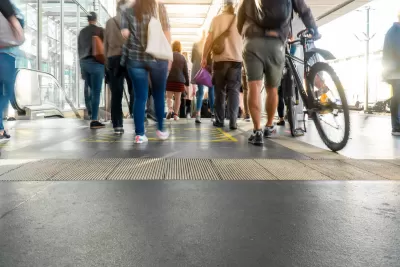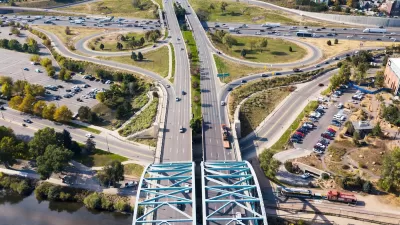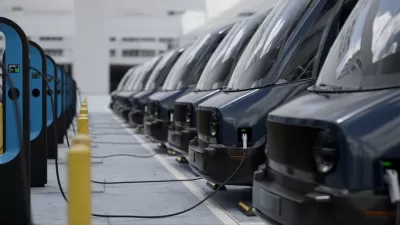California and Kentucky bookend a recent ranking of how well states are using federal infrastructure money to address climate change and racial inequities in their transportation networks.

Following the passage of the Inflation Reduction Act in 2022 and the Bipartisan Infrastructure Law in 2021, historic amounts of federal funding are going to states to invest in infrastructure projects, including transportation. The Biden administration has promoted the use of those funds to address environmental and equity concerns. However, most decisions about how the money is spent fall to state officials, writes Daniel Vock, senior reporter for Route Fifty.
To shine a light on how that’s panning out, the Natural Resources Defense Council (NRDC) recently analyzed and ranked the 50 U.S. states according to how well they are directing money from the infrastructure law to improve equity and climate outcomes in their transportation networks.
“A lot of what you read is the amount of money that is being spent, and that’s seen as a good thing in and of itself. But we would argue that what's more important than the amount of money is literally what is being built on the ground and who that is serving,” John Bailey, an NRDC advocate and one of the primary authors of the report, told Route Fifty.
“Researchers based their rankings on 19 separate factors, including the greenhouse gas impact of road projects, the deployment of electric vehicle chargers, efforts to encourage residents to avoid car trips, and procurement policies that promote women- and minority-owned businesses,” reports Vock.
According to NRDC’s report, the 10 states doing the most and the 10 states doing the least to improve equity and climate outcomes in their transportation networks are as follows:
10 states doing the most
- California
- Massachusetts
- Vermont
- Oregon
- Washington
- New York
- Colorado
- New Jersey
- Connecticut
- Minnesota
10 states doing the least
- Kentucky
- Louisiana
- Nebraska
- Alabama
- South Carolina
- Arizona
- Idaho
- Alaska
- Montana
- Mississippi
Full rankings for all fifty states as well as details on analysis are available in NRDC’s full report.
FULL STORY: The best and worst states for green, equitable transportation

Planetizen Federal Action Tracker
A weekly monitor of how Trump’s orders and actions are impacting planners and planning in America.

Congressman Proposes Bill to Rename DC Metro “Trump Train”
The Make Autorail Great Again Act would withhold federal funding to the system until the Washington Metropolitan Area Transit Authority (WMATA), rebrands as the Washington Metropolitan Authority for Greater Access (WMAGA).

The Simple Legislative Tool Transforming Vacant Downtowns
In California, Michigan and Georgia, an easy win is bringing dollars — and delight — back to city centers.

The States Losing Rural Delivery Rooms at an Alarming Pace
In some states, as few as 9% of rural hospitals still deliver babies. As a result, rising pre-term births, no adequate pre-term care and "harrowing" close calls are a growing reality.

The Small South Asian Republic Going all in on EVs
Thanks to one simple policy change less than five years ago, 65% of new cars in this Himalayan country are now electric.

DC Backpedals on Bike Lane Protection, Swaps Barriers for Paint
Citing aesthetic concerns, the city is removing the concrete barriers and flexposts that once separated Arizona Avenue cyclists from motor vehicles.
Urban Design for Planners 1: Software Tools
This six-course series explores essential urban design concepts using open source software and equips planners with the tools they need to participate fully in the urban design process.
Planning for Universal Design
Learn the tools for implementing Universal Design in planning regulations.
Smith Gee Studio
City of Charlotte
City of Camden Redevelopment Agency
City of Astoria
Transportation Research & Education Center (TREC) at Portland State University
US High Speed Rail Association
City of Camden Redevelopment Agency
Municipality of Princeton (NJ)





























